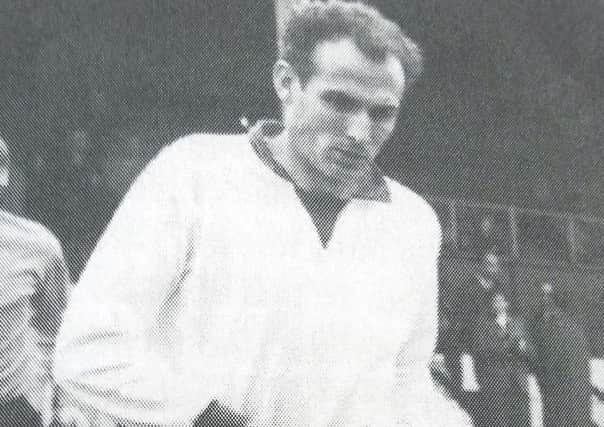Obituary: Harry Glasgow, footballer


Harry Glasgow was a well known Scottish footballer throughout the 1960s and into the ‘70’s who played almost 300 games for Clyde before finishing his career with Stenhousemuir whom he also managed. Captain of Clyde over a number of years,he led them in their outstanding 1966/7 season when they managed the remarkable feat,for a part time club,of finishing 3rd in the old 1st Division behind Celtic and Rangers. 1967 of course was when Celtic won the European Cup while Rangers lost the European Cup Winners Cup final in Germany to Bayern Munich to a goal in extra time.’
The Bully Wee’ also reached the Scottish Cup semi final that year being eliminated by Celtic but only after a replay .The Parkhead outfit played a total of 17 cup ties that season and the only one they failed to win was that first semi final against Clyde in front of 57,000. According to a press report of the tie,”Harry Glasgow was a grand captain and right back…”Much of the credit for the exceptional season was due to Glasgow whose consistently sound defensive play and leadership qualities made a huge contribution to the team’s success.
Advertisement
Hide AdAdvertisement
Hide AdTall and tenacious,he was a virtual ever present at right back with Eddie Mulheron as his partner on the other flank while other regulars in the defence were Dick Staite and John McHugh, the four of them playing a total of 1160 games for Clyde. Two years ago they had a highly enjoyable reunion at Harry Glasgow’s bowling club.
The team made an inauspicious start to the season failing to qualify from their League cup section and being knocked out of the Glasgow Cup by Partick Thistle but gathered momentum from October onwards when they were unbeaten in 24 of their 30 league games. Near the end of the season,to secure third place,they had to beat Stirling Albion away. After being 2-0 down at halftime and ,according to Glasgow “with the manager’s wrath ringing in their ears,”they staged a great comeback to win 5-2.
It was thought their third place finish qualified them for a European debut in the Fairs Cities’ Cup but with Rangers already in it,Clyde were ruled out as only one team per city was permitted and Dundee replaced them. Other influential players included goalkeeper Tommy McCulloch, midfielder Stan Anderson,centre forward Joe Gilroy and inside forward Harry Hood,later to join Celtic. To mark their outstanding achievement the whole team was inducted into Clyde’s Hall of Fame at a ceremony in 2014 although unfortunately Glasgow was unable to attend because of health problems.
Although Clyde currently play in the country’s lowest league they enjoyed a higher profile in the 1960’s as an old first division side,three times finishing in the top eight.
Indeed in the 1950’s they won the Scottish Cup twice and memorably beat Manchester United and Arsenal in friendlies. Their decline coincided with the loss of much of their core support when people were rehoused out of areas such as the Gorbals, Oatlands and Dalmarnock.
Born Henry Bird Glasgow in 1939 in Edinburgh,he was brought up in Stirlingshire. His career began with junior side Grangemouth United from whom he signed for Falkirk in 1960 then as an inside forward. As it was difficult breaking into the Bairns’ first team for whom he only managed a handful of cup games,in 1961/2 he was loaned out to Arbroath, playing 36 games there.
In 1963 he was signed for Clyde by John Prentice,later to manage Scotland,who had been his manager at Arbroath.Between then and 1972 he would go on to play 290 times for Clyde. Although a fixture at right back Harry occasionally deputised at centre half and on one memorable occasion in October 1969 played at centre forward against Airdrie at Broomfield, notching two goals. Another highlight of his Shawfield career was in 1969 when Clyde reached the League cup semi final only for Celtic to defeat them 1-0.
In 1972 Stenhousemuir manager Alex Smith signed him as player/coach for the Warriors to whom he would render excellent service,playing 66 matches for them. His favourite game was when they went to Ibrox in October that year and beat Rangers 2-1 in the League Cup,earning Harry and teammates a £25 bonus each.
Advertisement
Hide AdAdvertisement
Hide AdWhen Smith left in season 74/5 to manage Stirling Albion, he was appointed manager, remaining in post till 1981,the longest serving tenure in the club’s history. On a limited budget he did very well and was highly regarded at Ochilview,” a lovely man and a gent of the first degree” according to the club’s website.
After he resigned, he held a season ticket and regularly attended their home games for years.
Both Clyde and Stenhousemuir paid tribute to Glasgow with a minute’s silence at recent home fixtures. Social media tributes from Clyde fans described him as “Truly one of the greats” and “The Man,a true Clyde legend’.